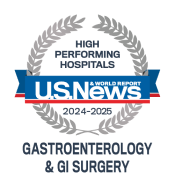T32 Training
NIH NIDDK T32 DK067872-20, Research Training in Gastroenterology & Hepatology
Program Director:
Jean-Pierre Raufman, MD
Co-Directors:
Erik C. von Rosenvinge, MD
Jian-Ying Wang MD, PhD
Description of Program
The goal of this NIDDK-sponsored training program, centered in the Division of Gastroenterology & Hepatology at the University of Maryland School of Medicine, is to prepare pre- and post-doctoral (MD, PhD, and MD/PhD) fellows for digestive diseases-related careers in academia, government, and industry. We recruit pre-doctoral trainees primarily from the Molecular Medicine track of the Graduate Program in Life Sciences, the Department of Microbiology & Immunology, and the Department of Pharmaceutical Sciences within the School of Pharmacy. We recruit postdoctoral trainees primarily from the Division of Gastroenterology & Hepatology Fellowship and Surgical Research programs. In this inter-disciplinary program, a productive, well-funded senior faculty with exceptional mentoring credentials is recruited from several Departments and Institutes within the School of Medicine, including the Departments of Medicine, Pediatrics, Surgery, Biochemistry & Molecular Biology, Microbiology & Immunology, Epidemiology & Public Health, and the Institute for Genome Sciences. This program offers the opportunity for Basic or Clinical Research training in three focused areas of investigation. Commitment to a minimum of two years of research training is required and trainees in the Clinical & Translational Science track without advanced degrees are expected to pursue coursework leading to advanced degrees (MS, MPH).
T32 DK067872-20 Trainees
July 2024

Contact Us
For additional information about this NIDDK-sponsored Training Grant, please contact:
Jean-Pierre Raufman, MD
Paulson Professor of Medicine
Director, Division of Gastroenterology and Hepatology
University of Maryland School of Medicine
22 S. Greene Street, N3W62
Baltimore, MD 21201
Tel: 410-328-8728
Fax: 410-328-8315
E-mail: jraufman@som.umaryland.edu
T32 Training Programs and Mentors
GI Mucosal Biology and Signaling
Faculty:
- Bruce Greenwald, MD
- Aikaterini Kontrogianni-Konstantopoulos, PhD
- Marcella Pasetti, PhD
- Jean-Pierre Raufman, MD
- Jian-Ying Wang MD, PhD
- David Joseph Weber, PhD
- Guofeng Xie MD, PhD
Gut Microbiome, Immunology & Genetics
Faculty:
- Eileen Barry, PhD
- Jonathan Bromberg, MD, PhD
- Scott Devine, PhD
- Hanping Feng, PhD
- Julie C. Dunning Hotopp, PhD
- Karen Kotloff, MD
- David Rasko, PhD
- Jacques Ravel, PhD
- Mary-Claire Roghmann, MD, MS
- Erik von Rosenvinge, MD
- Marcelo Sztein, PhD
- Sharon Tennant, PhD
Hepatobiliary Disorders
Faculty:
- Jonathan Bromberg, MD, PhD
- Shyamasundaran Kottilil, MBBS, PhD
- Zurabi Lominadze, MD
- Patricia Outeda, PhD
- James Polli, PhD
- Mary-Claire Roghmann, MD, MS
- Kirti Shetty, MD
- Michael Terrin, MD, MPH
- Nathalie Urrunaga, MD, MS
- Hongbing Wang, PhD
- Terri J. Watnick, MD
- Liqing Yu, PhD
Trainees will devote a minimum of two years to training in laboratory- or patient-based research (minimum 80% protected time). We expect trainees to participate in weekly laboratory or clinical research meetings, to attend relevant divisional, departmental, center or institutional research-oriented conferences, and to take courses on Responsible Conduct of Research. Additional courses in study design, statistics, and project-specific disciplines (e.g., gut immunology) are strongly encouraged as is participation for post-doctoral trainees in coursework leading to the granting of an additional degree (MS, MPH, or PhD).
Each year, this NIDDK-sponsored training program offers two pre-doctoral and four post-doctoral positions. In addition, supplemental funding may be available for senior medical students who wish to take a year off from their studies to pursue training in digestive diseases-related research and for qualified applicants from populations that are underrepresented in academic medicine. U.S. citizenship or permanent resident status is required.

